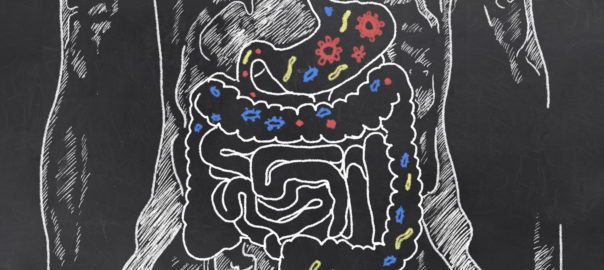It is now widely understood that good digestion within the gut is directly linked to brain function and behaviour. Indeed, this is so much so that the gut is often referred to as the ‘second brain’ and is revolutionising our understanding of the links between digestion, mood, health and even the way we think.
This week’s blog is provided by Jill Barber; a nutritional therapist, author and member of professional body BANT (British Association for Applied Nutrition and Nutritional Therapy Council) and CNHC (Complementary and Natural Healthcare Council). Jill looks at how digestion can affect cognitive function and helps to identify the link between the two.
Do you have the guts to be happy?
It may seem odd but how we digest food can affect our mood. Certain neurotransmitters are manufactured in the gut and affect our brain – so it follows that it’s really important that our whole digestive system is in good order, so that these chemical reactions can occur.
Food is one of the last things people think about when it comes to brain function. Neurotransmitters play a key role in cognitive function, behaviour and our well-being. Each cell used in the formation and function of the brain relies on specific micro and macro nutrients from food. The connection between the gut and brain is known as the gut-brain axis (GBA). This is a two way communication between the central and the enteric nervous system, this is the link between the emotional and cognitive parts of the brain with intestinal functions.One common example is when anxiety may lead to ‘butterflies in the tummy’ (Drossman, 2006)
It’s clear that good digestion is very important. The digestive tract is a long tube from the mouth to the anus. It exists within our bodies and yet its contents are excluded from our inner selves. Its principal roles are;
- the digestion and absorption of foods
- the management of a co-dependent community of bacteria
- the development and maintenance of the mucosal immune system which is the largest section of immune tissues in the body
Listen to the brain in your gut
The gut contains the second largest network of nerves outside of our heads and has been called our second brain. A complex system of signals sends information between the gut and our brain. These connections help us eat food and aid our digestion but they do much more, they can also affect our mood. Such as when we have a stomach bug we can be nauseas. It’s surprising that the key brain chemical serotonin is manufactured in the gut.
Serotonin is one of four ‘happiness’ chemicals. This chemical comes from our food except when we are fasting, when our gut bacteria manufacture it for us. So changes in gut bacteria will change this key brain chemical and potentially our mood. Our community of gut bacteria is called our Microbiome.
The human gut microbiome impacts the human brain health in numerous ways. Gut bacteria directly stimulate neurons of the enteric nervous system to send signals to the brain via the vagus nerve (3). The gut microbiota has the ability to produce a diverse range of compounds that play a major role in regulating the activity of many organs including the liver which is strategically positioned downstream of the gut. (4)
Gut microbiota related compounds are many and varied including, short chain fatty acids, bile acids, choline metabolites, vitamins, other lipids, neurotransmitters and neuroactive compounds, and hypothalamic-pituitary-adrenal axis hormones have many biological functions. (1)
Recent advances in research have described the importance of gut microbiota in influencing these interactions. This communication between microbiota and GBA appears to be bidirectional, namely through signalling from gut-microbiota to brain and from brain to gut-microbiota by means of neural, endocrine, immune, and humoral links. (2)
One link that emphasises this brain gut connection is the discovery that higher levels of anxiety and depression were significant predictors of developing IBS and other gastrointestinal disorders. (7)
Bienenstock, Kunze & Forsythe made it very clear when they stated that, “Changes in gut microbiota can modulate the peripheral and central nervous systems, resulting in altered brain functioning, and suggesting the existence of a microbiota gut-brain axis. Diet can also change the profile of gut microbiota and, thereby, behaviour.”, in the paper Microbiota and the gut-brain axis. (5)
How does diet affect gut bacteria?
It’s clear that we need a good variety of good bacteria to enable our body to work well. Foods that contain good bacteria tend to be fermented foods, such as yoghurt, kefir, sauerkraut, Kombucha, kimchi, cottage cheese, miso, natto and tempeh. These fermented foods contain transient beneficial bacteria, lactobacilli. Their transient nature means they have to be consumed regularly (e.g. live yoghurt daily) to be of benefit. It’s worth remembering that green tea promotes good bacteria (but it does contain caffeine).
Eating plenty of fibre from vegetables can ensure healthy bowel movements. If food is allowed to sit for too long in the digestive tract it can cause putrefaction, which can lead to harmful bacteria dominating the balance of gut bacteria. Fibre is found in whole grains (e.g. oats, brown rice), fruit, vegetables, beans & lentils.
There are two types of fibre found in varying amounts in food; soluble and insoluble. Soluble fibre slows digestion and helps regulate blood sugar and cholesterol levels. It’s plentiful in oats, oat bran, barley and psyllium. Foods such as wheat bran, whole grains, nuts and many fruits and vegetables contain mainly insoluble fibre. This type of fibre dissolves in water and can be broken down by the bacteria in your gut. This fibre also adds bulk to stool, helping it pass more quickly through the intestines.
The foods that feed our bacteria are called Prebiotics. They include: chicory, Jerusalem artichoke, fennel, onions, garlic, leeks, peas, beans, lentils, oats and fruit, especially bananas.
It’s worth taking measures to reduce stress, if you are under stress think about incorporating yoga, t’ai chi meditation, massage into your routine. Stress can negatively impact levels of beneficial gut bacteria.
The future
Worryingly only this July, Martin Blaser theorised that, ‘in recent decades, the incidence of many apparently unrelated chronic diseases has markedly increased’. He believes that losses of particular bacterial species of our ancestral microbiota have altered the context in which immunological, metabolic and cognitive development occur in early life, which results in increased disease. He says that ‘this ominous trend suggests that we must refocus efforts to understand and reverse the underlying circumstances that are responsible for our disappearing microbiota’.
It’s clear that not just the brain’s health but our whole well-being can be significantly helped by the correct selection of foods and fluids.
 Jill Barber
Jill Barber
Dip ION mBANT CNHC Nutritional Therapist
Jill has a passion for food and uses nutrition to give people the power to change their life for the positive. Optimising health and increasing potential.
After studying at the Institute of Optimum Nutrition. Jill qualified as a Nutritional Therapist. She is a member of professional body BANT (British Association for Applied Nutrition and Nutritional Therapy). She has also reached the occupational standards of the NTC (Nutritional Therapy Council), which has strict Codes of Practice and Ethics. She is registered with the Department of Health’s Complementary and Natural Healthcare Council (CNHC) and also with the NHS Directory of complementary and alternative practitioners. Jill practises from London, she teaches nutrition and also cooking. Jill also enjoys cooking for people.
http://www.lifetothepoweroffood.com
With many thanks to Jill Barber for this article. If you have any questions regarding the topics that have been raised, or any other health matters please do contact me (Clare) by email at any time.
clare@cytoplan.co.uk
Clare Daley and the Cytoplan Editorial Team
Related Cytoplan products:
Acidophilus Plus – Acidophilus Plus contains Lactobacillus Acidophilus and 8 further live native bacterial strains.
Fos-A-Dophilus – Fos-a-dophilus contains 6 strains of live native bacteria, plus a small amount of prebiotic.
Bibliography
(1) Venter JC, Adams MD, Myers EW, et al. : The sequence of the human genome. Science 2001;291:1304–1351
(2) Marilia Carabotti,a Annunziata Scirocco,a Maria Antonietta Maselli,b and Carola Severia. The gut-brain axis: interactions between enteric microbiota, central and enteric nervous systems; Ann Gastroenterol. 2015 Apr-Jun; 28(2): 203–209.
(3) Galland L. The gut microbiome and the brain. J Med Food. 2014 Dec;17(12): 1261-72.
(4) Usami M, Miyoshi M, Yamashita H. Gut microbiota and host metabolism in liver cirrhosis. World J Gastroenterol. 2015 Nov 7;21(41):11597-608.
(5) Bienenstock J, Kunze W, Forsythe P Nutr Rev. 2015 Aug;73 Suppl 1:28-31.
(6) Martin J. Blaser Nature Reviews Immunology 17, 461–463 (2017) doi:10.1038/nri 2017.77.Published online 27 July 2017
(7) N. A. Koloski, M. Jones, N. J. Talley. Evidence that independent gut-to-brain and brain- to-gut pathways operate in the irritable bowel syndrome and functional dyspepsia: a 1 year population-based prospective study Alimentary Pharmacology & Therapeutics Volume 44, Issue 6, pages 592–600, September 2016 Jill Barber Dip ION mBANT CNHC Nutritional Therapist http://www.lifetothepoweroffood.com
Last updated on 16th October 2017 by cytoffice



What a brilliant article !
At last recognition of the interaction of our second brain .
In Ayurvedic practice the gut is always the first issue to be addressed.!
So much for modern medicine which often does not treat holistically but amazing now science and a better understanding and education through articles like this is promoting better health attitudes.
Very interesting article and well worth reading. My osteopath/naturopath has often told me the correlation between food and mood and this article sets it out well. Thank you.
very good article; it helped me with crohn`s disease.
Food and mood are a two way process, I think. What we eat may raise or lower our mood, but equally our mood may influence what we eat – we all know about comfort foods! May we have a “food and mood” article which includes info on the least harmful ‘comfort’ foods, please
Thank you for your suggestion Veronica-Mae – it would be an interesting topic and we can certainly give this some consideration!
Regards,
Kate
I have been taking Cytoplan “Acidopholus” for ages and also live yogurt, It does not seem to make much difference. Should I change to another probiotic ?
Hi Veronica-Mae,
It is difficult to make recommendations without knowing more information about the health issues you are experiencing. Please feel free to contact our Nutritional Advisor Jackie@cytoplan.co.uk to discuss this in more detail.
Kind regards,
Kate